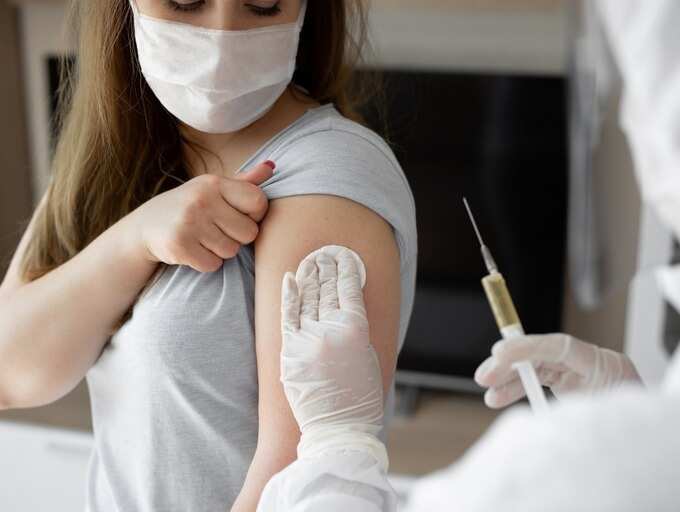Vaccinating against COVID-19 is a critical step towards protecting yourself. However, this is a period when COVID-19 instances are still spreading, and there is an equal and frightening chance of contracting the illness. Thus, it is possible for an individual to be symptomatic or test positive at the time of immunization yet stay ignorant. Additionally, statistically, given the rapid pace of vaccination rollouts, it is conceivable that many patients were asymptomatic or presymptomatic at the time of their immunization date.

What would happen if you received the vaccination while COVID+?
Are you still eligible for vaccination? If yes, might this impair the vaccine’s efficacy?
How likely is it that you will test positive right now?
While we have passed the crest of the second wave, our battle against COVID-19 is far from done. Not only is the virus still there, but the Delta variety and Delta plus are causing a rise in cases, particularly in areas with a high-risk threshold, and are now posing a global threat. Not only is it critical to maintain COVID-appropriate behavior, but it may be extremely worrying to detect symptoms or test positive just before being vaccinated since the newest forms of the virus are more frightening for people who are unprotected or have low immunity.
What are the recommendations made by guidelines?
Current recommendations from prominent health organizations advise that those who are currently COVID + (have tested positive and are quarantining) or who suspect COVID symptoms should delay vaccination and instead finish the quarantine period. However, with a virus as unique as the SARS-COV-2, and with its rapid dissemination, it is uncommon for a person to stay asymptomatic, acquire signs and symptoms later, and therefore be unaware of being positive. Nonetheless, because a positive COVID patient is more likely to transfer the illness to others in a public vaccination area, it is recommended that anybody who has been exposed to a COVID+ person or even suspects the smallest symptoms stay at home and focus on recovery before scheduling the shot.
Additionally, anyone exhibiting symptoms of a non-COVID illness or a respiratory infection is asked to postpone vaccination.
What happens if you are infected with COVID and receive the vaccine?
As noted previously, it is conceivable that many people who show up for their vaccine appointment are unaware of their possible positive status until they have a clinical test.
While it is unsettling to consider vaccination while someone is already COVID+, there is yet no definitive data regarding how the vaccine will behave when an active virus is present in the body. This, however, may depend on whether someone is exhibiting symptoms and the severity of those symptoms.
According to some research, receiving the COVID vaccination when already unwell with the virus may not have any adverse effects and may even interfere with the vaccine’s effectiveness. While further research is necessary, scientists believe that vaccinations operate independently of the virus that has already triggered inflammation in the body. However, because the virus is known to spread rapidly, the presence of a potential positive individual, with or without symptoms, may represent a risk to other individuals, including healthcare personnel on the job. While asymptomatic instances may not manifest, anyone with related symptoms or a probable contact history with someone who tested positive should stay at home and postpone the injection to avoid endangering the health of others.
Will it result in a decrease in vaccination efficacy?
While an ongoing infection in the body may not harm the vaccination, some scientists believe that a suspected COVID-19 case will certainly reduce the virus’s effectiveness. Simply put, the vaccination may be less capable than predicted of triggering a healthy immunological response.
The vaccine’s function is contingent upon the vaccine’s effectiveness and antibody production. When a person is suspected of being ill, it indicates active inflammation in the body, which means the immune system is already engaged in combating the same and may be unable to mount an equivalent, healthy, and efficient response when the vaccination dosage is administered into the body. The vaccine’s effectiveness and immune response may also be compromised by the severity of the infection and infectious symptoms present at the time.
Could the adverse consequences be more severe?
Due to the fact that illness already activates your immune system (whether symptomatic or asymptomatic), it might have a direct effect on the immunological response elicited by the vaccination. If there is already some amount of inflammation in the body, or if you are exhibiting symptoms, the vaccine’s adverse effects may exacerbate the severity of the condition or make it take longer to resolve.
Would there be advantages?
Despite the evidence that vaccination did not improve the strength of the immune response or the severity of side effects, preliminary research indicates that there may be a silver lining to all of this—a probable speedier recovery and a likely decrease in the severity of the illness.
While it’s critical to keep in mind that this is still under investigation, vaccination administration may be able to stimulate the immune system into action (even if it’s somewhat slow) and therefore shorten the recovery time and severity of your symptoms if you are positive. This is also observed in individuals who have been vaccinated yet get a breakthrough illness.

